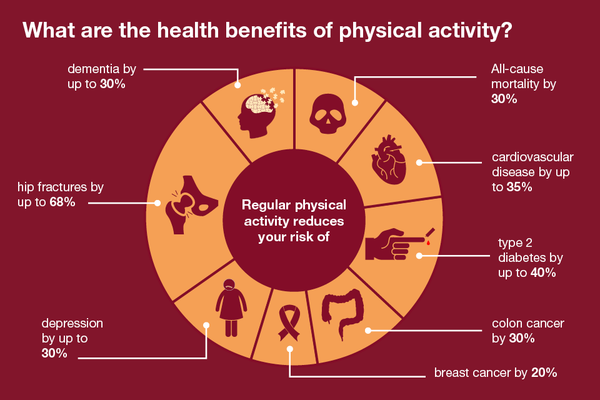
Regular exercise is widely recognized as a cornerstone of a healthy lifestyle, offering numerous benefits for both the body and mind. This article explores the multifaceted advantages of engaging in physical activity, from enhancing cardiovascular health and strength to promoting mental well-being and reducing the risk of chronic diseases. Discover the transformative power of exercise and learn how incorporating regular physical activity into your routine can lead to a happier, healthier life.
Physical Health Benefits of Exercise

Cardiovascular Fitness and Endurance
Heart Health: Regular exercise strengthens the heart muscle, improves circulation, and lowers blood pressure, reducing the risk of heart disease and stroke.
Endurance: Increased aerobic capacity enhances the body’s ability to sustain physical activity for longer periods, improving overall stamina and energy levels.
Muscle Strength and Flexibility
Muscle Tone: Resistance training and weight-bearing exercises build muscle strength and tone, supporting joint health and reducing the risk of injuries.
Flexibility: Stretching exercises improve flexibility and range of motion, enhancing mobility and reducing stiffness.
Weight Management and Metabolism

Calorie Burn: Physical activity burns calories, aiding in weight management and fat loss when combined with a balanced diet.
Metabolic Health: Regular exercise boosts metabolism, regulates blood sugar levels, and improves insulin sensitivity, reducing the risk of type 2 diabetes.
Mental Health Benefits of Exercise
Stress Relief and Mood Enhancement
Endorphin Release: Exercise stimulates the release of endorphins, neurotransmitters that promote feelings of happiness and relaxation, reducing stress and anxiety.
Mood Regulation: Physical activity can alleviate symptoms of depression and anxiety by improving mood, self-esteem, and cognitive function.
Cognitive Function and Brain Health
Brain Boost: Exercise enhances cognitive function, memory retention, and learning ability by promoting neuroplasticity and increasing blood flow to the brain.
Age-Related Decline: Regular physical activity may reduce the risk of cognitive decline and dementia as individuals age.
Long-Term Health Benefits
Disease Prevention and Management
Chronic Diseases: Regular exercise lowers the risk of chronic conditions such as cardiovascular disease, hypertension, osteoporosis, and certain cancers.
Immune Function: Physical activity boosts the immune system, reducing the likelihood of infections and promoting overall health.
Longevity and Quality of Life
Healthy Aging: Maintaining an active lifestyle contributes to longevity and improves quality of life by preserving mobility, independence, and vitality.
Sleep Quality: Regular exercise promotes better sleep patterns and quality, aiding in restorative sleep and overall well-being.
Tips for Getting Started and Staying Active
Establishing a Routine
Set Realistic Goals: Start with achievable goals and gradually increase intensity and duration as fitness improves.
Variety: Incorporate a mix of aerobic, strength training, and flexibility exercises to target different muscle groups and keep workouts engaging.
Making Exercise Enjoyable

Find Activities You Enjoy: Choose activities that align with your interests and preferences, whether it’s dancing, hiking, swimming, or team sports.
Stay Consistent: Schedule regular exercise sessions into your weekly routine and prioritize physical activity as part of your daily life.
Conclusion: Embracing the Benefits of Exercise
Regular exercise offers a wealth of benefits for both physical and mental well-being, making it an essential component of a healthy lifestyle. From improving cardiovascular fitness and muscle strength to enhancing mood, reducing stress, and lowering the risk of chronic diseases, the positive effects of physical activity are profound and far-reaching. By prioritizing regular exercise and adopting a balanced approach to fitness, individuals can experience improved overall health, increased vitality, and enhanced quality of life. Embrace the transformative power of exercise today and embark on a journey towards a healthier, happier you.






